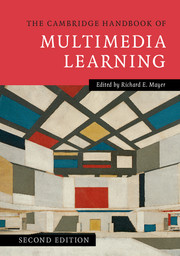Book contents
- The Cambridge Handbook of Multimedia Learning
- The Cambridge Handbook of Multimedia Learning
- Copyright page
- Contents
- Contributors
- Preface
- Acknowledgments
- 1 Introduction to Multimedia Learning
- Part I Theoretical Foundations
- Part II Basic Principles of Multimedia Learning
- 6 Ten Common but Questionable Principles of Multimedia Learning
- 7 The Multimedia Principle
- 8 The Split-Attention Principle in Multimedia Learning
- 9 The Modality Principle in Multimedia Learning
- 10 The Redundancy Principle in Multimedia Learning
- 11 The Signaling (or Cueing) Principle in Multimedia Learning
- 12 Principles for Reducing Extraneous Processing in Multimedia Learning: Coherence, Signaling, Redundancy, Spatial Contiguity, and Temporal Contiguity Principles
- 13 Principles for Managing Essential Processing in Multimedia Learning: Segmenting, Pre-training, and Modality Principles
- 14 Principles Based on Social Cues in Multimedia Learning: Personalization, Voice, Image, and Embodiment Principles
- Part III Advanced Principles of Multimedia Learning
- Part IV Multimedia Learning of Cognitive Processes
- Part V Multimedia Learning in Advanced Computer-Based Contexts
- Author Index
- Subject Index
6 - Ten Common but Questionable Principles of Multimedia Learning
from Part II - Basic Principles of Multimedia Learning
Published online by Cambridge University Press: 05 August 2014
- The Cambridge Handbook of Multimedia Learning
- The Cambridge Handbook of Multimedia Learning
- Copyright page
- Contents
- Contributors
- Preface
- Acknowledgments
- 1 Introduction to Multimedia Learning
- Part I Theoretical Foundations
- Part II Basic Principles of Multimedia Learning
- 6 Ten Common but Questionable Principles of Multimedia Learning
- 7 The Multimedia Principle
- 8 The Split-Attention Principle in Multimedia Learning
- 9 The Modality Principle in Multimedia Learning
- 10 The Redundancy Principle in Multimedia Learning
- 11 The Signaling (or Cueing) Principle in Multimedia Learning
- 12 Principles for Reducing Extraneous Processing in Multimedia Learning: Coherence, Signaling, Redundancy, Spatial Contiguity, and Temporal Contiguity Principles
- 13 Principles for Managing Essential Processing in Multimedia Learning: Segmenting, Pre-training, and Modality Principles
- 14 Principles Based on Social Cues in Multimedia Learning: Personalization, Voice, Image, and Embodiment Principles
- Part III Advanced Principles of Multimedia Learning
- Part IV Multimedia Learning of Cognitive Processes
- Part V Multimedia Learning in Advanced Computer-Based Contexts
- Author Index
- Subject Index
Summary
The chapter begins with a brief summary and extension of our earlier list of 5 questionable multimedia principles (Clark & Feldon, 2005). We then add 5 more principles that have gained traction in recent years. The goal of the chapter is to provide evidence-based explanations of why each of the 10 principles is problematic and to suggest alternative generalizations that are more firmly based on evidence. The updated questionable beliefs include the expectations that multimedia instruction: (1) yields more learning than live instruction or older media; (2) is more motivating than other instructional media; (3) provides animated pedagogical agents that aid learning; (4) accommodates different learning styles and so maximizes learning for more students; and (5) facilitates student-managed constructivist and discovery approaches that are beneficial to learning. The more recent additions and the focus of this discussion are expectations that multimedia instruction benefits learning by providing: (6) autonomy and control over the sequencing of instruction; (7) higher-order thinking skills; (8) incidental learning of enriching information; (9) interactivity; and (10) an authentic learning environment and activities.
Keywords
- Type
- Chapter
- Information
- The Cambridge Handbook of Multimedia Learning , pp. 151 - 173Publisher: Cambridge University PressPrint publication year: 2014
- 26
- Cited by



